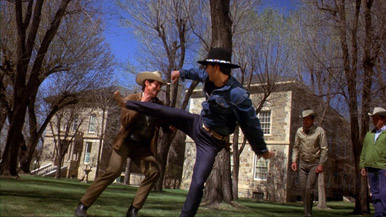Viking Night: Billy Jack
By Bruce Hall
October 14, 2014
BoxOfficeProphets.com

It also didn’t hurt that Laughlin had a lot to say about the genocide of Native Americans, gun control, violence against women, corruption in government, political activism, tolerance, war, peace, racism and - reportedly - a partridge in a pear tree. So, what better vessel to encompass this cornucopia of ideas than a half white, half Indian Vietnam veteran karate kicking cowboy who’s turned his back on society, only to keep getting drawn back in? And where The Born Losers positioned Billy Jack as a generic metaphor for racism and intolerance, this time he’s a mythical hero who pops out of the bushes like magic whenever innocent people have a problem.
This time, instead of squaring off against outlaw bikers, Billy (Laughlin) has taken to living in seclusion on an Indian reservation, learning the mysteries of the universe from the tribe’s medicine man. There’s a small town near the reservation, and the Indians and townspeople share a tenuous, but largely peaceful coexistence. That doesn’t stop the town’s Mayor - let’s call him Boss Posner (Bert Freed) - and his goons from rustling mustangs off Indian land, slaughtering them and selling the meat for dog food. Billy rides up on the men one day and drives them off with his patented combination of badass marksmanship and fierce squinting. This doesn’t sit well with Posner or his right hand man, Deputy Mike (Ken Tobey).
In fact, Deputy Mike is in such a bad mood, things go pear shaped when he returns home to find his estranged daughter Barbara (Julie Webb) back from a summer in San Francisco, where her hippie “friends” passed her around until she became knocked up, and then sent her home. Deputy Mike bravely contains his outrage until she mentions the possibility of the baby being non-white, at which point he bravely beats her senseless. So, not only are the local police mean to animals, they also hate minorities and are not above bouncing a pregnant woman off the walls when she gets uppity. That’s your tax dollars at work, friends.
Somehow Barbara ends up on the reservation, where Billy takes her to the Freedom School - a home for wayward children run by his girlfriend Jean (Delores Taylor). The school is a casual, drug free environment where everyone is encouraged to contribute according to their gifts. Barbara quickly fits in but unfortunately, Deputy Mike wants his daughter back - presumably to finish beating the hell out of her.
There’s also the small issue of Billy intervening when Posner’s gutless son Bernard (David Roya) mistreats a group of Jean’s students. And by “intervening” I mean “kicking everyone in the face”. Billy has appointed himself guardian and protector of the Indian way of life, but this put him at odds with just about everyone in town. Being part of the reservation can only protect the school from Posner for so long, and Bernard seeks revenge against Billy on a much more personal level. If Billy Jack were the garden variety revenge flick it sounds like, it would easily be one of my favorite movies.
But it’s not. Laughlin and Taylor (who were husband and wife) co-wrote the story, and their myriad political leanings turn out to be the driving force behind the film. I applaud their desire to draw attention to the social issues of the day, but there are so many messages in this movie it’s impossible to get anything meaningful out of it. Billy’s violent temper is certainly at odds with the way of life he’s chosen, but contrary to some, I find this to be a valid source of narrative conflict. I like the idea of a peaceful man who is driven to violence by a massive abuse of power.
What I don’t like is the sprawling second act, which attempts to humanize things by detailing the school’s attempt to build bridges with the town. I’d like to say the point is to lull us into a false sense of security for the explosive third act, where Billy fights a phalanx of Posner's rednecks on top of a burning train. Instead, it’s an excruciating half hour of anti-establishment doubletalk and philosophical grandstanding. Billy Jack boasts a few memorable scenes, and some truly iconic moments – but by and large the entire movie is peppered with such incongruities.
When Billy first encounters Posner and his cronies he suggests that when the police break the law, then the laws no longer apply - which seems like an unnecessarily bleak leap of reason. At another point Billy invokes the Kennedy brothers, lamenting the lack of gun control in America - as he loads up for another shootout. And near the end of the film, he swears to never hurt anyone again if Jean can name one place on earth where people truly love each another - and she misses an excellent chance to say “How about the Freedom School you’ve spent this entire movie defending?”
Billy Jack was marketed as an action film, but it's really a counter-culture passion project that's content to evangelize in circles until you throw your hands up and agree that everything is fucked. I'm not so sure there's a message here as much as a nihilistic streak of anger. I’m sure they meant well, but the Laughlins would have done well to provide the broad strokes and let a competent screenwriter craft their script. They created a truly memorable character, and stuck him with a clunky, meandering story. Ironically, that's just the sort of injustice that would prompt Billy Jack to kick you right in the face.